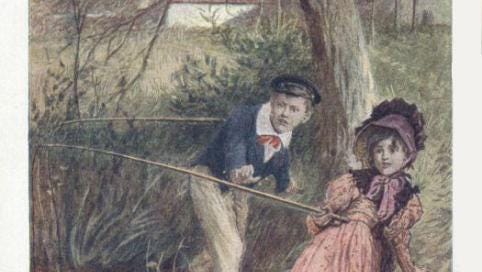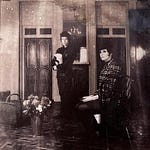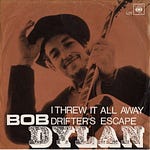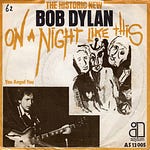This week, Kelly and Daniel discuss "Little Maggie" off 1992's Good As I Been to You. Before they go deep on a slew of versions over the past hundred years, Kelly breaks down the best and the worst (well, only one worst) Maggie's. Tune in Thursday for Mixed Up Confusion where we'll talk playlists, GLOW, and Rozwell Kid.
SHOW NOTES
In Bob’s ‘Letter to Dave Glover’ from the 1963 Newport Folk Festival program, he wrote:
i can’t sing “Little Maggie” with a clear head, i gotta sing “Seven Curses.”
The song was recorded for 1992’s Good As I Been to You, Dylan’s first acoustic record in 27 years to that point. Hindsight being what it is, it’s easy to understand the feelings from both sides after this album was released. As for “Little Maggie,” Michael Gray elevates the material beyond first listens in his Bob Dylan Encyclopedia:
this endlessly rewarding demonstration of the strengths of traditional folksong and pre-war acoustic blues, the two forms used in flexible alternation, sets up all manner of resonance and dialogue, shifting and circling and forming a richly persuasive whole that works both as an impassioned treasury of folksong and an intimate revelation of how firmly some specifics of Dylan’s own early styles and songs were founded upon this material.
As for the song itself (4:00), it’s old. Damn old. Over two hundred years old. And that’s just in America. “I think it’s an amazing testament to the power of music that I could survive before recording technology,” Kelly notes, before referencing “Darling Cory” (spelled every which way under the sun), “Little Maggie’s” cousin, if you will; it’s “lyric and tune family.” To not tread over more stellar work done by others over the years, the song was found in the Appalachian region in the late 1800s. As Richard Matteson, Jr. writes, “The family of tunes probably originates late in the 19th century and belongs to the then developing tradition of white blues ballads.”
Before going any further, Kelly mused on all Maggie’s for the week (6:15). “Where does the name Maggie comes from,” she asks herself. “Well, I didn’t get into it… In retrospect, I really should have.” Maggie can be short for Margaret, Magdalene, Margarita. She does a short flyover of Maggie country, starting with the fictional: Maggie Green from The Walking Dead, Maggie Simpson, Maggie Walsh from Buffy the Vampire Slayer, Maggie the Frog from Game of Thrones, Maggie Grace from Lost (well, Maggie Grace isn’t fictional, she’s a real person. Shannon is the fictional character. Sign on the Window regrets the error – though it was damn funny).
Then, magnificently, we delve into Maggie Tulliver from 1860’s The Mill on the Floss by George Eliot (pseudonym of Mary Anne Evans), which must be heard to be believed. As Kelly succinctly put it:
Drowned dumb Maggie. That’s her name. Fuck Maggie Tulliver. Fuck The Mill on the Floss. Fuck the King
What about real Maggie’s? Maggie Grace, who we already know! Maggie Thompson. Maggie Roswell. Maggie Hasan. Maggie Wheeler (Janice on Friends). Maggie Smith, obvs. The WORST MAGGIE AWARD goes to Maggie Gallagher. FUCK YOU! While the BEST MAGGIE AWARD is given to Maggie L. Walker.
Daniel and Kelly finally dig into “Little Maggie” (16:00): Kelly is definitely coming down hard for Bob and his guitar-version of Dylan. She loved Maggie, doin’ her, sorry you caught feelings, livin’ her life. Kelly admitted that she viewed the song from the prospective of a sad lesbian who is into this girl who keeps sleeping with these dudes but it’s okay because she’ll keep holding the torch for Little Maggie. “Bob Dylan: the croaky voiced lesbian!”
Daniel compiled as many versions of the song as time would allow (Gray and Whitter’s 1928 “original,” Dylan’s version, Ralph Stanley and Robert Plant’s, and the Kingston Trio) and delved into the similarities and differences. Perhaps they’re biased, but the Maggie version they prefer was Dylan’s version, which inverts the story and incorporates a few of the song’s cousins (“Darling Corey,” “Hustling Gamblers,” “Country Blues”) to craft a different characters.
Daniel was initially nervous about the song — but it paid off. Lines like, “Little girls are made for boys love but not Little Maggie, she’s made for mine!” aren’t inherently welcoming but it turned out great. To close with Michael Gray once more, waxing poetic on the quality of song and tradition as some
lost work from some opium- thralled folk archivist throwing his own torrid genius into celebrating the myriad strengths of anonymously created song: song from before there was a music industry to kill off its mystery and its purpose.
Oh, before we forget. A dram glass, also known as a joey glass, is a tumbler from the 17th century.
MIXED UP CONFUSION
THE EPISODE’S BOOKLET & PLAYLIST
RECOMMENDATIONS (29:00)
Kelly watched all of GLOW on Netflix while Daniel listened to the new Rozwell Kid album, Precious Art and caught up on Mikey Erg’s Tentative Decisions.
ENDINGS (31:15)
As Daniel prepared, Kelly brings up Johnny Cash’s “Hurt.” There are 524 songs remaining. Kelly picked #302 – which would have been the excellent "Black Crow Blues" from 1964’s Another Side of Bob Dylan – but it was #399 instead, the classic "I Want You" from 1966’s Blonde on Blonde.
Next week: Hold on to your flutes!
Follow us wherever you listen to podcasts. See our real-time playlist See That My Playlist is Kept Clean on Spotify. Follow us intermittently on Twitter and Instagram.
Tell your friends about the show, rate and review wherever they let you, and consider supporting us by subscribing or at Patreon.















Share this post